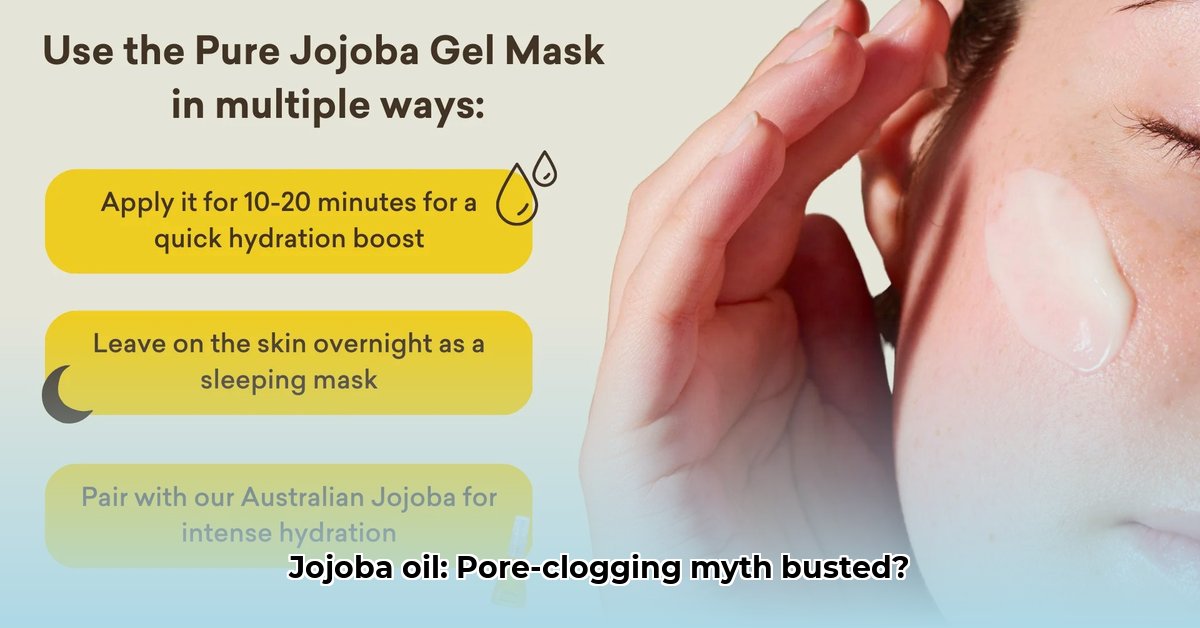So, you’re wondering if jojoba oil is a friend or foe to your pores? Lots of people are using it, but the internet’s full of mixed messages. This article cuts through the confusion by looking at real scientific studies to figure out if jojoba oil actually clogs pores. We’ll cover everything from how it works on your skin to whether it’s good or bad for acne and eczema, and give you practical tips so you can decide if it’s right for you. For more on natural skincare ingredients, check out this helpful article on natural product shelf life. Let’s get to the bottom of this!
Jojoba Oil and Pore Congestion: Separating Facts from Fiction
Let’s face it: We all want clear, healthy skin. And with so many skincare products promising miracles, it’s easy to get overwhelmed. Jojoba oil, a popular natural ingredient, often pops up in skincare routines, but does it live up to the hype? More specifically, does it clog those pesky pores? Let’s delve into the science and separate fact from fiction regarding pore congestion and jojoba oil benefits.
Understanding Jojoba Oil: More Than Just an Oil for Skin Hydration
Before we jump into the pore-clogging debate and consider factors like skin hydration, let’s clarify what jojoba oil actually is. Unlike many oils derived from plants, jojoba oil isn’t technically an oil at all; it’s a liquid wax ester. This unique chemical structure is surprisingly similar to our skin’s natural sebum – the oily substance that keeps our skin moisturized and protected. This similarity is what makes jojoba oil so interesting in the skincare world. Some believe this similarity might be the key to its gentleness on pores. Did you know jojoba oil is chemically similar to our skin’s sebum? This structural similarity could explain why it integrates so well with our skin!
Does Jojoba Oil Clog Pores? The Great Debate on Comedogenicity
The question of whether jojoba oil clogs pores is more complex than a simple yes or no. Numerous studies suggest it’s non-comedogenic (meaning it probably won’t block your pores). But, individual experiences can vary widely, and there’s still ongoing research to fully understand its effects on comedogenicity. Dermatologists suggest that jojoba oil’s molecular makeup prevents it from trapping and blocking pores.
The Non-Comedogenicity Factor in Avoiding Breakouts
Many scientific studies support the idea that jojoba oil is unlikely to clog pores. Its unique molecular structure seems to prevent it from easily getting trapped and causing blockages, unlike some heavier oils. This doesn’t mean it’s entirely impossible, but based on the current research, it suggests a low risk for those wanting to avoid breakouts. The comedogenic scale rates ingredients from 0 to 5, with 0 being non-comedogenic. Jojoba oil typically scores around a 2, indicating a low risk of pore-clogging.
Acne and Jojoba Oil: A Surprising Connection for Treating Inflammation?
Here’s where things get interesting. Some studies even hint that jojoba oil might help with acne. The idea is that because it’s similar to our natural sebum, it might help regulate oil production, signaling to the skin that it doesn’t need to produce excess oil. Furthermore, its anti-inflammatory properties could soothe irritated skin and reduce breakouts. However, it’s crucial to remember that this isn’t a guaranteed cure. It’s more of a potential benefit for treating inflammation, not a guaranteed solution for everyone. Is it possible to use jojoba oil for regulating oil production on your skin? Absolutely, that is why many acne suffers use it to calm breakouts
Beyond Acne: Exploring Potential Benefits for Other Skin Conditions
Jojoba oil’s moisturizing and anti-inflammatory qualities aren’t limited to just acne. Some research suggests it might be beneficial for conditions like eczema, rosacea, and psoriasis. By keeping the skin well-hydrated, it could potentially improve the overall health of pores and reduce the likelihood of clogging. The improved skin hydration may lead to healthier pores, which are less prone to becoming clogged. But, again, the need for more research is important to solidify this. It is crucial to explore if the moisturizing ability of jojoba oil helps other skin conditions. A study in the Journal of the American Academy of Dermatology showed promising results for using jojoba oil in managing eczema symptoms.
The Allergy Factor: A Necessary Precaution on Your Skin
While generally considered safe for topical application, allergic reactions to jojoba oil are possible, although rare. This is why a patch test is always a vital first step before applying it to a large area of skin. A simple patch test on a small, inconspicuous area like the inner arm or behind the ear can help you determine if you have any sensitivities or skin reaction. If you have sensitive skin it is best to test a very small patch before applying on your face.
A Summary of the Evidence: What We Know (and Don’t Know About Jojoba Oil)
Let’s summarize the research findings regarding jojoba oil in a clear and concise way:
| Aspect | Finding |
|---|---|
| Comedogenicity | Likely non-comedogenic; low risk of clogging pores (comedogenic rating of 2). |
| Acne Treatment | Shows potential benefits; may reduce inflammation and some breakouts. |
| Other Skin Conditions | May improve skin hydration and offer benefits for some conditions like eczema and psoriasis. |
| Allergic Reactions | Possible, although rare; a patch test is recommended before widespread use. |
How to Use Jojoba Oil Safely and Effectively on Your Face
Since individual reactions can vary, it’s important to use jojoba oil cautiously and mindfully. Here’s a simple guide for the face:
- The Patch Test: Before applying to your face, apply a small amount to your inner arm and wait 24-48 hours to check for any reactions. If you experience redness, itching, or irritation, discontinue use.
- Start Slow: Begin with a tiny amount of jojoba oil and gradually increase as tolerated. 2-3 drops are sufficient.
- Application: Apply to clean, slightly damp skin. This helps to lock in moisture.
- Listen to Your Skin: Pay close attention to how your skin reacts. If you notice any breakouts, dryness, or other negative changes, stop using the oil and consult with a dermatologist if needed.
The Bottom Line: Your Skin, Your Answer on Using Jojoba Oil in Skincare Routine
While research generally suggests jojoba oil is unlikely to clog pores and may even offer skin benefits, everyone’s skin is unique. The best way to know if it works for you is to try it cautiously, following the guidelines above. Remember to listen to your skin, and don’t hesitate to seek advice from a dermatologist if you have any concerns or questions regarding your skincare routine. The ongoing research into jojoba oil’s effects continues to evolve, so stay informed and follow your skin’s cues. A 2018 study published in the journal Evidence-Based Complementary and Alternative Medicine found that jojoba oil improved skin hydration after 30 minutes of application.
How to Use Jojoba Oil for Eczema and Psoriasis Treatment to Minimize Flare-Ups
For those battling eczema and psoriasis, jojoba oil presents a potentially soothing and hydrating option. Its anti-inflammatory properties may assist in calming irritated skin, while its moisturizing capabilities can alleviate dryness, a common symptom of these conditions. Let’s explore how to maximize the benefits of jojoba oil for eczema and psoriasis:
Key Takeaways:
- Jojoba oil, similar to our skin’s natural oils, may help moisturize dry, irritated skin.
- It’s generally considered non-comedogenic, meaning it’s unlikely to clog pores. This is important because clogged pores can worsen existing skin conditions.
- While promising, more research is needed to confirm its effectiveness for eczema and psoriasis.
- Use jojoba oil as a complement to, not a replacement for, prescribed treatments.
- Always perform a patch test before full application to check for allergic reactions.
Understanding Jojoba Oil and Your Skin Type Needs
Jojoba oil isn’t just another oil; it’s a liquid wax ester remarkably similar to our skin’s sebum. This makes it exceptionally compatible with our skin. Many consumers find it helps prevent dryness and irritation. But does this mean it’s a miracle cure for every skin issue? Not exactly. However, it is important to understand skin type needs. While jojoba oil is generally well-tolerated, those with extremely sensitive skin should proceed with caution.
Jojoba Oil and Pore Clogging: Friend or Foe for your Skin Health?
A common skincare concern is whether oils clog pores. So, does jojoba oil affect skin health? Generally, studies suggest it’s non-comedogenic—meaning it shouldn’t clog pores. This makes it a potentially good choice for various skin types, even those prone to breakouts. However, individual reactions vary. A small patch test is always a good idea. Look for cold-pressed, unrefined jojoba oil for maximum benefit.
Jojoba Oil for Eczema and Psoriasis: How to Use It for Managing Symptoms
How to Use Jojoba Oil for Managing Symptoms:
- Patch Test: Before applying to a
- Glass Lid Storage Containers Keep Food Fresh and Safe - January 19, 2026
- Borosilicate Glass Storage Delivers Durability and Safety for Meals - January 18, 2026
- Best Meal Prep Containers for Fresh and Organized Meals - January 18, 2026










